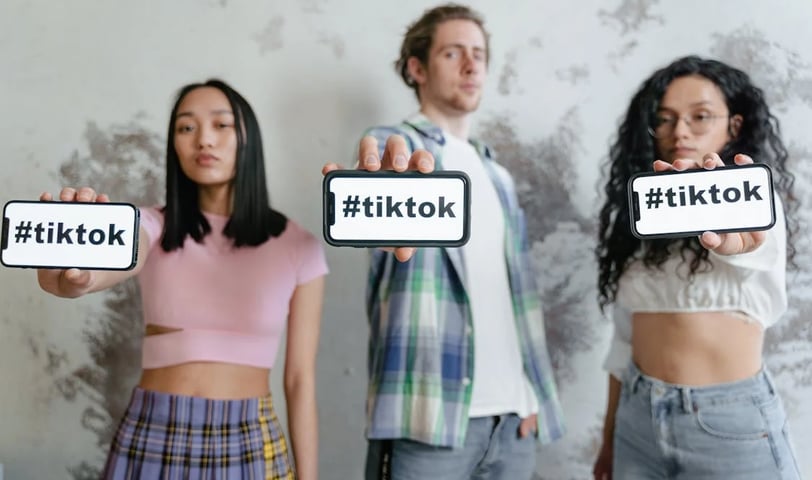Health Information from TikTok
Explore the latest health information and trending health tips from TikTok. Discover valuable insights and stay updated on health trends shared by the TikTok community.
QUANTITATIVE RESEARCH
Realyn Manalo
5/16/20253 min read


TikTok, once a platform known primarily for dance challenges and viral entertainment, has rapidly evolved into a source of health information for millions worldwide. With its short-form videos and high engagement rates, TikTok has become particularly influential among younger demographics seeking quick and accessible answers to health-related questions. However, this shift raises critical concerns about the accuracy, credibility, and educational value of the information shared on the platform. While TikTok holds promise for expanding public health reach and patient education, it also poses challenges related to misinformation, content moderation, and user discernment. Understanding how users interact with health content on TikTok—and how that content can be improved—is vital for safeguarding health literacy in the digital age.
Who Can Use These Topics?
This research is ideal for students and professionals pursuing the following courses or strands:
College Programs:
BS in Public Health
BS in Nursing
BS in Health Sciences
BS in Communication
BS in Psychology
BS in Medical Technology
Senior High School Strands:
Humanities and Social Sciences (HUMSS)
Science, Technology, Engineering, and Mathematics (STEM)
General Academic Strand (GAS)
Why This Topic Needs Research
The influence of TikTok on public health discourse is growing, but research has yet to address critical gaps:
Content quality and credibility remain inconsistent: While TikTok increases awareness, strategies are still needed to raise the standard and trustworthiness of health-related videos (Azli et al., 2025).
Misinformation spreads faster than expert-led content: Videos tagged with medical terms often go viral regardless of accuracy. Research must explore how healthcare professionals can create equally engaging yet evidence-based content (Selberg et al., 2025).
Users struggle to identify credible sources: Especially among young women, trust is often based on appearance or authority cues, not verified credentials, increasing the risk of acting on false information (Kirkpatrick & Lawrie, 2024).
Limited understanding of learner and professional perspectives: Medical students and professionals acknowledge TikTok’s educational potential, but more data is needed on their real-world experiences and usage barriers (Shrivastava & Shrivastava, 2023).
Lack of academic integration frameworks: Students use TikTok in learning, but educators need clearer methods to support critical evaluation of non-traditional health content (Garrido et al., 2025).
No universal evaluation metrics: Popularity metrics (likes, shares) do not guarantee educational value. Frameworks are needed to assess quality beyond engagement, especially in underserved regions (Izquierdo-Condoy et al., 2025).
Unclear impact on long-term health behaviors: While TikTok content may influence short-term actions, its effect on sustained understanding and decision-making remains poorly studied (Hasham et al., 2025).
Feasibility & Challenges by Target Group
Get Your Free Thesis Title
Finding a well-structured quantitative research topic can be challenging, but I am here to assist you.
✔ Expertly Curated Topics – Not AI-generated, but carefully developed based on existing academic studies and research trends.
✔ Comprehensive Research Support – Includes an existed and updated research gaps, explanation of variables as well as SDG relevance.
✔ Personalized for Your Field – Get a thesis title tailored to your academic requirements and research interests.
Prefer video content? Subscribe to my YouTube Channel for expert insights on research topics, methodologies, and academic writing strategies.
References
Azli, N. N. K., Rizal, S. H. N. M., Ridzuan, A. R., Baharuddin, N. U. B., Mahlin, M. A., Sataria, I. I., & Jamri, M. H. (2025). The Level of Effectiveness of Healthcare Education on Tiktok. e-Journal of Media and Society, 8(1), 48-57.
Garrido, S., Losa, B., Caballero, M., Alvarez, A., Raffaeli, G., Cavallaro, G., ... & Garrido, F. (2025). A survey on the perception of health degree students on the use of Instagram and TikTok as learning tools. Educación Médica, 26(4), 101044.
Hasham, M. A., Parshuram, V., & Bandre, G. R. (2025). Social media in healthcare: Transforming patient engagement, education, and research dissemination. International Journal of Academic Medicine, 11(1), 4-9.
Izquierdo-Condoy, J. S., Arias-Intriago, M., Mosquera-Quiñónez, M., Melgar Muñoz, F. P., Jiménez-Ascanio, M., Loaiza-Guevara, V., & Ortiz-Prado, E. (2025). Assessing the educational impact and quality of medical microvideos on TikTok: the case of Latin America. Medical Education Online, 30(1), 2474129.
Kirkpatrick, C. E., & Lawrie, L. L. (2024). TikTok as a source of health information and misinformation for young women in the United States: survey study. JMIR infodemiology, 4(1), e54663.
Selberg, A. M., Pei, M., Nguyen, H. N., Bosland, A., & Beebe, K. S. (2025). TikTok,# kneepain, and medical (mis) information. Journal of Orthopaedic Reports, 4(3), 100405.
Shrivastava, S. R., & Shrivastava, P. S. (2023). Utilizing the tool of tiktok in medicine, public health, and medical education. Medical Journal of Dr. DY Patil University, 16(1), 22-27.
